Literary Devices Used in Satire
Sanghyun Ahnにより

1. Hyperbole
1.1. The man on page 43 states that he is 172 years old. I think that is extremely exaggerated since it is nearly impossible for a man to live that long. Voltaire tries to satirize the stereotype that all old people are wise and reasonable.
1.2. During page 42, the amount of food there is extremely exaggerated. A feast for two weary travelers is quite unusual and seems to be a bit stretched from the truth. I think Voltaire wanted to satirize the amount of luxury some people had.
2. Irony
2.1. Candide is given a drink to toast to the king on page 4, and then is drafted to the army. This is very ironic because, Candide thought that there was no harm in taking one drink, but it would later send him out to war. Voltaire is trying to satire the medieval methods of drafting people to war.
2.2. On page 5, the army decides to sing for the king. However, we can see that the only thing the king has brought upon was violence and war. This is very ironic because, normally a person wouldn't sing for a king who only brought war. I think that Voltaire is trying to satirize the
3. Understatement
3.1. On page 43, it states that the room was only encrusted with rubies and emeralds. This is an understatement because, normally rubies and emeralds would be considered of extreme value. I think Voltaire is trying to satirize how the really rich people view money
3.2. On page 17, Cunegonde talks about her rape and wound as if it was nothing. It is an understatement because, normally a person would be frantic by then, but she was quite calm and emotionless. I think that Voltaire might have tried to satirize girls that were not exactly the purest girl in town, and people who endured so much that they just lost all hope.
4. Pangloss's name on page 2, can be considered as an oxymoron. He is a philosopher, and the term pangloss means to be very superficial and fake. I think Voltaire is trying to satirize the philosophers who tended to be glossy.
5. Allusion
5.1. Voltaire describes the monkeys as the two women's lovers on page 38. This is an allusion because the monkeys represent other people who have lovers who are not accepted by society. For example, it can be viewed as a slave owner marrying his slave during the time when America was into slavery. I think that Voltaire is trying to satirize people's generalizations on love.
5.2. During page 58, Voltaire asks if the people of Paris always laugh like that. What the people of Paris represents, is France's image in general. Voltaire is trying to satirize that the French are always happy, and seem to be joyful in whatever situation.
6. Oxymoron
6.1. Candide's valet supposedly is very wise and knowledgeable on page 32. However, his name depicts that he is a liar and a fake. Voltaire is trying to satirize all the people out there who pretend to be smart, when their not.
6.2. On page 79 it states, "Take me to her, so we can die in joy." This is an oxymoron because one does not usually die of joy. I think Voltaire is satirizing Candide's love for Cunegonde. He is saying that he will go to the extent of dying just to see Cunegonde.
7. Parody
7.1. On page 1, Voltaire parodies the nobles through Thunder-Ten-Tronckh. I think he tries to depict the less intelligent nobles through this character. Furthermore, Voltaire satirized these nobles because, the nobles back then tended to be really poor, and some were stupid. They would cling on to their title, while not really knowing fully what it was.
7.2. On page 42, Voltaire depicts El Dorado was the ultimate utopia that every one wants to go. During Voltaire's time, most of the world was unknown to humans, and every one hoped for a utopia in the outside world. This hope can be seen as a beacon of light, but can be seen to other people as a fool's gold. Voltaire satirizes people's hope here, by writing about the perfect utopia that every one dreams about.


